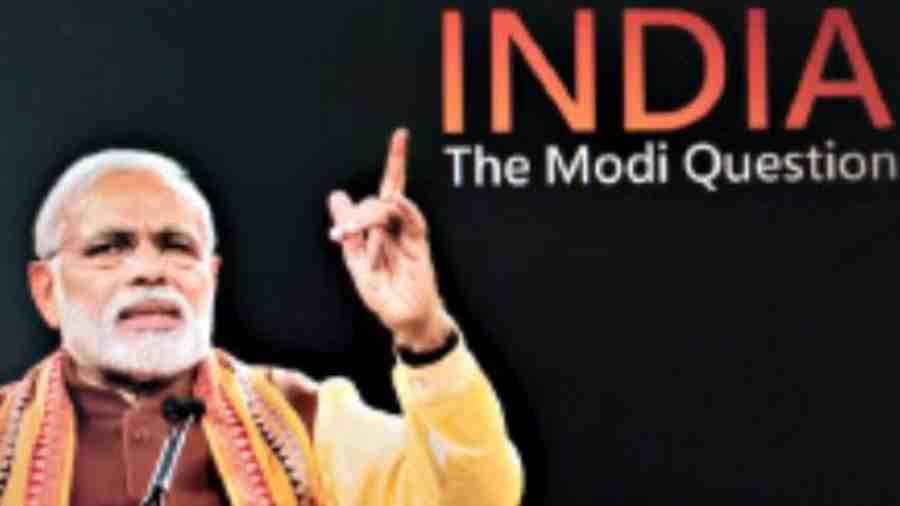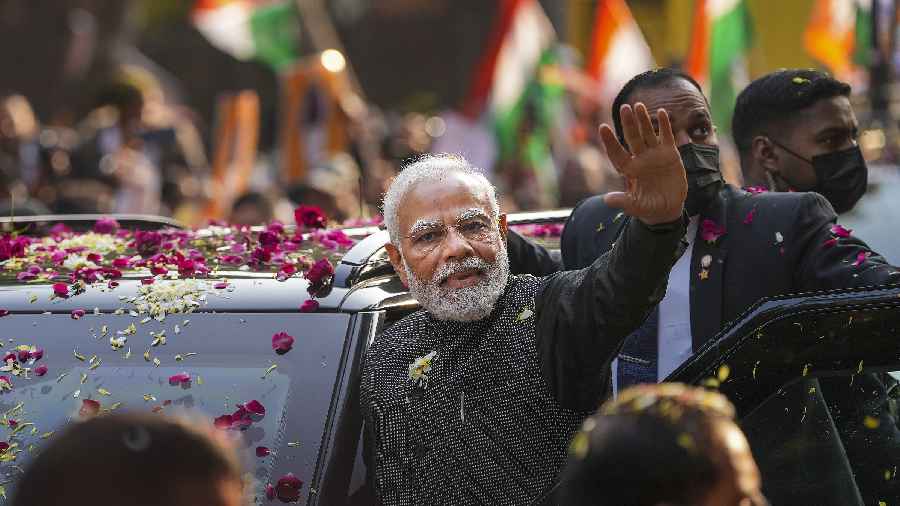The Centre has described the BBC documentary, India: The Modi Question, which takes a critical look at then chief minister Narendra Modi’s role during the 2002 Gujarat riots, as a reflection of a continuing colonial mindset.
But to G. Mohan Gopal, former director of the National Judicial Commission, it’s the government’s reported directive to Internet platforms to take down links to the documentary that signifies a restoration of colonial traditions that sought to protect the British rulers against any criticism.
The eminent jurist suggested it was absurd to claim that questioning a chief minister’s actions of 2002 amounted to undermining India’s sovereignty in 2023 just because the same person was now Prime Minister.
“It’s clear, therefore, that the issue is not about criticism of the then chief minister of Gujarat or the Prime Minister of India. The issue is criticism of the persona of Narendra Modi, quite irrespective of the office he holds,” Gopal, who was also director of the Bangalore-based National Law School of India University, told The Telegraph on Monday.
He added: “When our government censors and silences speech critical of the government, it defeats our freedom movement and sends a wrong signal to the British that their colonial policies still reign supreme in India.”
Gopal said “a central pillar of the British colonial government was silencing criticism of colonial rule or the rulers”.
“Gandhi was convicted in the famous sedition trial of1922 for a speech critical of the government — not for engaging in any violent activities. Sharing the speech and image of Mahatma Gandhi was banned by colonial authorities,” he said.
“Regulating what is read, seen and heard by the people of India was a central part of British colonial policy in India. They developed the tools and methods to enforce that system, which is now being applied by this government.”
Gopal added: “Our freedom struggle sought to establish a democratic government that would protect speech critical of the government. This was (to) secure an environment in which we are free to think, read, reflect and speak.”
He said many past governments in independent India too had used colonial-era laws, such as the sedition law and other provisions that suppress views critical of the government, notably during the 1975- 77 Emergency.
‘Lèse-majesté’
Gopal added: “The BBC documentary criticises the role of the then chief minister of Gujarat in 2002. Its focus is not the role of the Prime Minister of India. Yet, the government says the BBC documentary ‘undermines the sovereignty and integrity of India’.
“Did then Prime Minister Atal Bihari Vajpayee undermine the sovereignty and integrity of India when he criticised the role of the then chief minister of Gujarat on the same issue, the 2002 carnage?
“The message is clear. The persona of Narendra Modi cannot any longer be criticised. Any criticism of Modi, in whatever capacity, past or present, undermines the sovereignty and integrity of India because the sovereignty and integrity of India is now embedded in his persona.”
This message, he noted, was also conveyed recently by the Union government to the Supreme Court collegium when it sought reconsideration of a candidate for the position of high court judge on the ground that he had shared on social media posts critical of Modi.
“Are we seeing the revival in India of the British colonial Lèse-majesté offence that criminalises criticism of the persona of the monarch in whom the nation’s sovereignty and integrity rests and who must therefore be above criticism?” Gopal said.
Universal jurisdiction
“Under the doctrine of universal jurisdiction, any national court anywhere in the world, so authorised by the laws of the country, may prosecute individuals for serious crimes against international law, including crimes against humanity, regardless of where the crime was committed and the nationality of the perpetrator or the victim,” Gopal said.
“What happened in Gujarat in 2002 was a ‘crime against humanity’ as the term is defined under international law. As a result, most countries in the world would be seen in the eyes of the global community as having jurisdiction in ensuring accountability of the perpetrators of the crimes against humanity that occurred in Gujarat in 2002. India will have little support in claiming that a crime against humanity is a purely domestic internal issue.”
‘Disrespectful’
“Attempts to censor and silence the people and ‘protect’ them from certain views that the government finds distasteful are basically paternalistic and disrespectful to the people,” Gopal said.
“Such attempts treat the people as unintelligent and imbecilic, who cannot be trusted to form the right judgment and therefore what they read, see and hear ought to be controlled. The people of India have firmly rebuffed such attempts to restore colonial-era restrictions on freedom, and will undoubtedly do so again.”
Not a clean chit
Gopal argued that it was incorrect to see the June 2022 Supreme Court judgment, which upheld a special investigation team’s exoneration of Modi in a riot conspiracy case, as a “clean chit”.
“As a general matter, the criminal justice system is not in the business of giving a clean chit to anyone. The role of the judiciary in criminal cases is to determine whether an accused is guilty of the charges based on the evidence presented to the court. If not, the court ‘acquits’ the person of the charges. Courts do not declare anyone innocent,” he said.
He said the narrow issue before the Supreme Court was “whether the magistrate’s court was right in refusing to take cognisance of the offences alleged in the 2006 complaint filed by one of the victims, Zakia Jafri, in her private capacity, and closing the complaint”.
“In the event, the Supreme Court upheld the decision of the magistrate, as Gujarat High Court had previously done,” he said.


